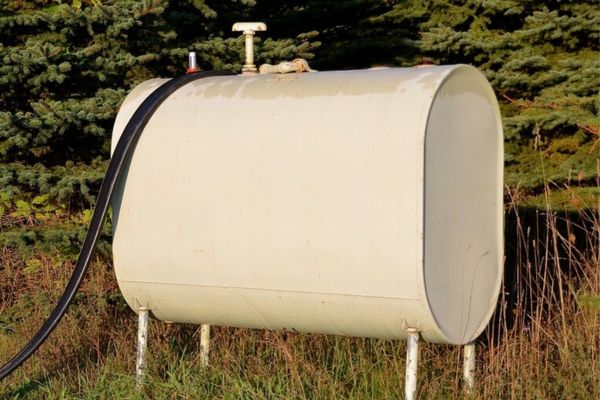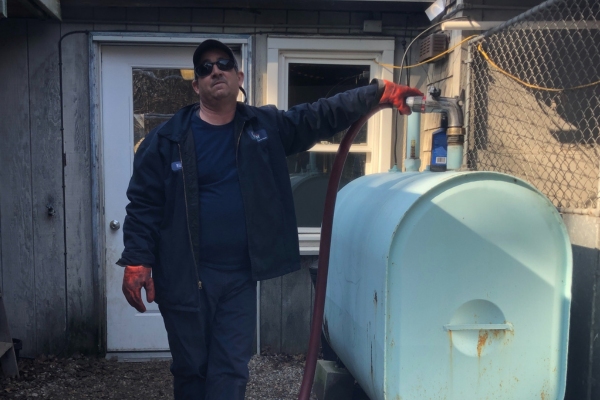Contents
- 1 Understanding the Formation of Sludge in Heating Oil Tanks
- 2 Exploring Heating Oil Tank Sludge
- 3 What Causes Fuel Oil Tank Sludge?
- 4 Problems Associated with Home Heating Oil Tank Sludge
- 5 Strategies to Prevent Heating Oil Tank Sludge
- 6 Conclusion
- 7 Contact Wilcox Energy for Dependable Heating Oil Deliveries
In many homes, heating oil keeps the indoors and showers hot while stored safely in residential fuel tanks. The longevity of the oil supply varies, depending on tank size and household usage, but it provides sustained warmth throughout the colder months. Maintaining the integrity of your oil tank is crucial to avoiding issues such as sludge buildup—a viscous, troublesome substance that inevitably forms over time.
While preventing sludge formation entirely is impossible, proactive measures can significantly delay its onset, ensuring your tank operates optimally for its intended lifespan. This article from Wilcox Energy will explore the nuances of heating oil tank sludge, emphasizing how it forms and the best practices for its prevention.
Understanding the Formation of Sludge in Heating Oil Tanks

The creation of sludge in heating oil tanks is a slow-moving process that depends on various conditions. By grasping the elements contributing to sludge formation, you can better prevent its occurrence. In the following sections, we explore the fundamental components, common causes, potential issues, and practical advice for prevention.
Exploring Heating Oil Tank Sludge
A heating oil tank is more than a fuel storage unit; it often contains accumulations of dirt, debris, rust, and moisture. In the tank’s dark and moist conditions, microorganisms find a hospitable environment to flourish. These elements collectively sink to the bottom of the tank, mingling to form a thick, problematic sludge.
The risk of sludge formation escalates in nearly empty tanks, where leftover fuel stagnates over long periods. Homeowners typically neglect their tanks once the winter passes, only to recall the need for maintenance as temperatures drop again. During refills, fuel delivery personnel might discover the presence of sludge, highlighting the issue.
For top-quality heating oil and exceptional service, choose Wilcox Energy. Contact us to learn more!
What Causes Fuel Oil Tank Sludge?
Heating oil tanks are designed with a vent pipe that allows air to flow in and out, aiding in maintaining pressure equilibrium. As oil is delivered, air is expelled, often heard as a whistle, and air enters as fuel is used. This exchange can lead to condensation inside the tank when cold, moist air cools on the inner walls. Over time, rust forms and flakes, settling at the bottom. Additionally, leftover fuel reacts with elements like light, heat, air, rust, and water, creating an environment where bacteria thrive and gradually form sludge.
Problems Associated with Home Heating Oil Tank Sludge
Here, we outline the complications arising from oil tank sludge.
Reduced Heating Efficiency

Mitigating oil tank sludge is essential for maintaining the efficiency of your heating system. Without proper management, the problem intensifies. Consider the nature of sludge: it’s dense and sticky, prone to obstructing the supply line and clogging the oil filter. Such blockages can starve the heating system of necessary fuel.
When oil does manage to seep through, a clogged filter still compromises energy efficiency, leading to increased heating costs. For Wilcox Energy customers, addressing this issue is crucial to prevent elevated expenses and ensure reliable warmth.
Trust Wilcox Energy for reliable and clean heating oil. Reach out to us for your next delivery!
Risks of Heating System Breakdown
Overlooking sludge buildup in your heating oil tank is a slow-moving hazard that could strain your HVAC system. While it might not demand immediate action, the gradual impact can lead to severe outcomes, including a complete system shutdown. Sludge can infiltrate critical components, inflicting damage and causing your furnace or boiler to fail. Addressing such breakdowns often means incurring significant costs for major HVAC repairs to restore functionality.
Additionally, tanks compromised by leaks and sediment buildup may need replacement. For those with aging tanks showing signs of rust, considering a replacement is advisable to prevent further complications.
Strategies to Prevent Heating Oil Tank Sludge

Preventing sludge formation is crucial—acting proactively can spare you from the headaches of associated problems later. Consider these effective strategies to keep your tank pristine and avoid sludge accumulation:
Schedule Regular Heating Oil Deliveries
The risk of sludge formation increases as fuel levels drop, allowing more air—and its inherent moisture—to enter and condense on the tank’s inner walls. To prevent this, it’s essential to schedule oil deliveries regularly and avoid letting your tank run too low.
Delaying until the tank is nearly empty heightens the risk of clogging the fuel line, which could unexpectedly disrupt your heating supply and leave your home without warmth. Proactively contact your local supplier to arrange timely deliveries.
For top-quality heating oil and exceptional service, choose Wilcox Energy. Contact us to learn more!
Incorporate Heating Oil Additives
Using a chemical additive is an effective way to prevent sludge accumulation in your heating oil tank. Introduce the additive into the tank before your next fuel delivery to help break down existing sludge, facilitating easier cleaning. When selecting an additive, ensure it contains a dispersant compound—critical for effective sludge management.
You’ll find various online options with additional benefits, such as algae prevention, water removal, and wax inhibition. These treatments help reduce particle size, allowing them to flow smoothly through the fuel lines and filters.
To keep the system clean, it is advisable to treat your tank once per heating season. Additionally, some heating oil suppliers may already include these additives in their fuel. Always check with your provider to confirm if additives are pre-included in their oil to avoid redundancy.
Inspect Your Heating Oil Tank
Show your heating oil tank some tender loving care by regularly replacing the oil filter and scheduling professional inspections. Technicians can thoroughly examine your tank for any signs of clogs or sludge deposits and address these issues promptly to prevent further complications.
Opt for High-Quality Home Heating Oil
Many might view heating oil as a generic commodity, but not all fuel oils are created equal. Opting for premium quality oil can significantly reduce the potential for sludge, as it contains fewer contaminants.
Select a supplier, like Wilcox Energy, that is known for its high standards and positive reputation within your community. Consult with neighbors to find the best company that delivers clean fuel and offers assistance with sludge management. A reputable supplier will ensure your system runs smoothly and guide preventive maintenance you can perform at home.
Keep Your Heating Oil Tank Full

A common practice among homeowners is to refill their heating oil tanks primarily during the colder months, often leaving the tank nearly empty during spring and summer. Most of the tank’s volume is filled with humid air, creating ideal conditions for rust and sludge to develop.
To prevent these issues, consider keeping your tank full throughout the year, even when the heating system isn’t used. A full tank minimizes the presence of air and water vapor, reducing the risk of rust formation and bacterial growth.
Conclusion
Despite their static appearance, oil tank interiors are quite dynamic. Air and fuel continuously circulate in and out while water vapor condenses on the inner walls, fostering corrosion and promoting bacterial growth. Maintain a clean and full tank to prevent the formation of sludge. Opt for premium-quality oil from trusted suppliers, and don’t hesitate to enlist professional help for advanced maintenance tasks to ensure your heating system remains efficient and effective.
Contact Wilcox Energy for Dependable Heating Oil Deliveries

Wilcox Energy is devoted to providing homes and businesses in the Southern Connecticut shoreline with reliable heating oil delivery services. We prioritize the timely and effective delivery of premium heating oil, seamlessly ensuring your comfort and warmth. Our commitment to exceptional service is reflected in our competitive prices and clear communication, with your satisfaction as our primary goal.
Choosing Wilcox Energy means selecting a trustworthy provider for all your heating oil demands. Renowned for our dependable services and a strong dedication to customer contentment, Wilcox Energy remains a steadfast community ally, eager to satisfy your heating needs and keep your living or working spaces warm and inviting throughout the year. Contact us today to begin!
For more information about our heating oil deliveries or HVAC services, be sure to contact Wilcox Energy. You can click here to contact us or call us at (860) 399-6218. Call now!
Related Articles:
